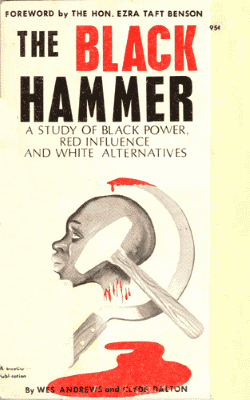The Black Hammer facts for kids
The Black Hammer: A Study of Black Power, Red Influence and White Alternatives is a book written in 1967 by Wes Andrews and Clyde Dalton. It is known because Ezra Taft Benson wrote the foreword. Benson was a former Secretary of Agriculture for President Dwight D. Eisenhower. He was also an important leader in the Church of Jesus Christ of Latter-day Saints.
What is The Black Hammer About?
This book was written because the authors, Wes Andrews and Clyde Dalton, believed that the Civil Rights Movement was being influenced by Communism. They thought that the goals of the movement were being changed by communist ideas.
Who Wrote the Foreword?
In 1967, Ezra Taft Benson gave a speech about his thoughts on the civil rights movement. This speech was published in a magazine called Christian Crusade. Benson then allowed this speech to be used as the foreword for The Black Hammer book. This meant he supported the book's ideas.
What Did the Book Say?
The book did not support the Civil Rights Act of 1964 and other civil rights laws. It claimed that organized efforts for civil rights were "part of the 100 year old Communist program for the enslavement of America." The authors also wrote that there were "well-defined plans for the establishment of a Negro Soviet dictatorship in the South."
The book also suggested that civil rights laws might make Black Americans less self-reliant. It claimed these laws encouraged Black people to depend too much on the government.
However, the book also said that African Americans were victims of this supposed communist plan. It stated that the authors were "ready and willing to take any Negro by the hand and help him into an era of self-proprietorship that every deserving American can achieve." This meant the authors believed Black Americans were being misled and could achieve success if they followed different paths.


